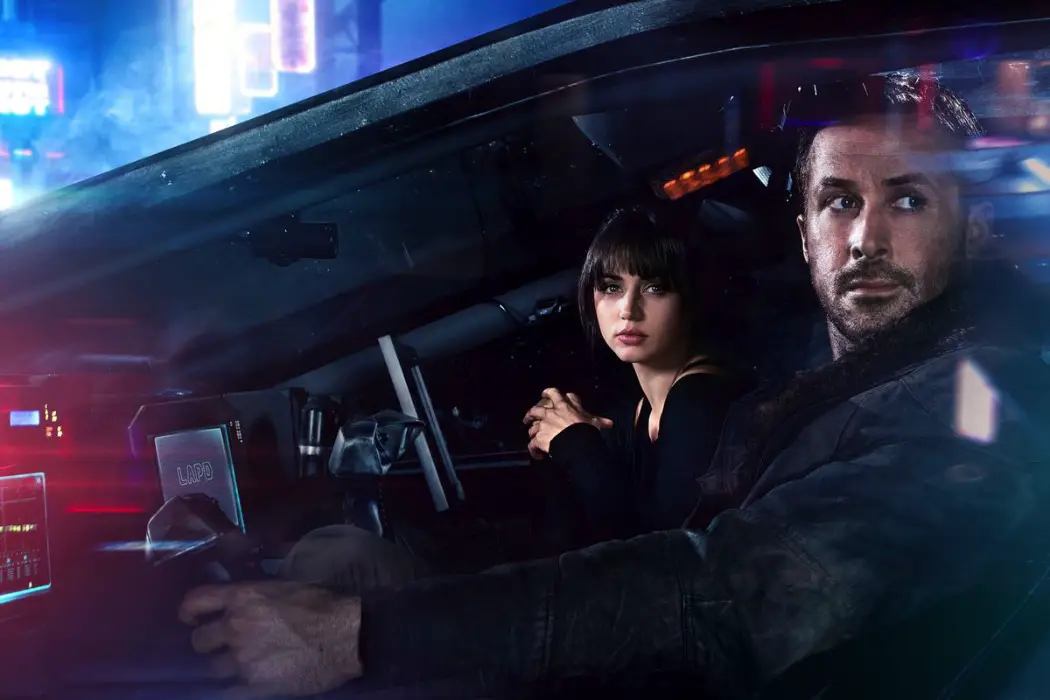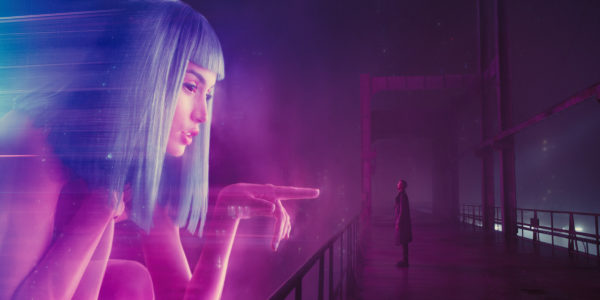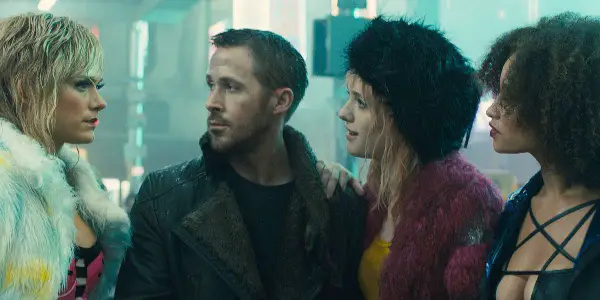BLADE RUNNER 2049: More Misanthropic Than Misogynistic?

Frank H. Wu is William L. Prosser Distinguished Professor at…
Blade Runner 2049 can be anticipated to follow the arc of the original, from commercial failure to critical success. Our accelerated pace allows for reappraisal already. How gender is handled in the movie is important to any interpretation of it. The concerns that have been raised about the female characters perhaps understate, rather than overstate, the problem that is presented by an enthralling vision.
Human relationships now verge on the impossible. Even if most individuals of the species have been difficult throughout history, we were compelled to interact in households that typically contained grandparents, cousins, and multitudes whom we had known since birth and expected to know until death; the reclusive replicant Rick Deckard (Harrison Ford) has nothing on us peers to him, in our friendless condition.
Can We Dream Anymore?
I recently rewatched Blade Runner 2049 especially to consider gender. In evaluating the film’s implications for our own reality, which is what any fiction of its genre is intended to prompt, I am mindful that as a male viewer, I must check my own bias, including what I am only barely conscious of, if at all. The male gaze is the source of the sexualization, according to those who want to block its impact.
In an earlier analysis, I pointed out that the new movie adjusted the anti-Asian prejudice of its predecessor and the obscure “sidequel,” Soldier . Others have noted that it did so by eliminating major Asian parts, as if the Asian community in toto had escaped off world. There is not even an engineer who designs eyes. Hannibal Chew (James Hong) was relegated to that component of the android in service of the mastermind maker, Eldon Tyrell (Joe Turkel) who is self-consciously God-like.
The sequel secured its status in the science fiction canon immediately, winning admiration for its artistry. Few big-budget Hollywood releases have been described so reverently as “dystopian” and “existential,” or been presented so self-consciously as epic (A Luc Besson space opera would be derided for dialogue about “breaking the world.”). Unlike its predecessor, it was recognized from its release for a fully formed back story, masterful direction, and visual grandeur, garnering five Oscar nominations and winning for both cinematography and visual effects.
With hindsight, the box office goals were doomed to be disappointed, given the budget and the hype. The money was well spent. Director Denis Villeneuve (Arrival, Sicario, Prisoners), as acclaimed as predecessor Ridley Scott on a per-movie basis, wasted none of the 2 hour 44 minute running time. But that takes a long sit in an era conditioned by the six-second video loop. The Blade Runner iteration of the multi-verse does not even contain smart phones. People there could focus.
Might Men Dream of Women Without Being Sexist?
The complaint about the women who appear, in what is more a mystery than an action-thriller, is that they are commodities. The recurring question, awkward to answer, is whether a depiction of gender inequity also is an example of it. It would be a cavil to note that the one most provocative in this regard, Joi (Ana de Armas), is not a woman but a digital companion to a replicant, so neither party in the relationship is anything but a representation of a human being, one virtual, another physical.
That does not excuse anybody (or anything), because the very point of the plot is to challenge the concept that we can or should distinguish between the artificial and the natural. Eventually, an academic theorist will write a paper considering whether it is possible to rape a robot. That will not be a thought experiment either. Thanks to the #MeToo movement of profound change, one of those rare historical moments we perceive as such as we live through it, an accusation of sexism will not be dismissed as it might have in an earlier era. The Bechdel test admits no exceptions for automatons. Thus nothing here is, or should be taken as, defense of misogyny. To the contrary, it is an indictment on the charge of misanthropy.

What might be even more disturbing is that all of the personalities are empty, or, their interactions with one another are bereft of feeling – except for the attachment of the male lead, nicknamed K (Ryan Gosling), who is not supposed to be able to experience genuine sentiment to his protean companion (an algorithm that can be downloaded onto a portable device, and, for that matter, purchased as a plug-and-play product). There is no proper name for the intimacy.
The situation evokes the Turing test and Searle‘s Chinese Room, the two stylized versions of assessing machine intelligence, or, in this case, machine emotion. The Tyrell Corporation’s Voight-Kampff machine alludes to Turing’s theorem and Searle’s refutation. The British analyst who broke the German Enigma code during World War II with an early computer, Turing posited that we eventually would be unable to differentiate between human behavior and its machine counterpart, and, therefore, we would have to admit to humanity the machine that could mimic so well.
A contemporary philosopher of language, Searle argues that a black box that produces perfect translations from English to Chinese cannot on the basis solely of its work be said to comprehend the texts, rather than be credited for simulating the same. Turing, Searle, and Voight-Kampff all gesture at the basic dilemma running through Blade Runner 2049, including as to chauvinism. How do we know we don’t have it exactly backward, fooled by an imitation?
Must Women Dream of Men in the Movies?
There is another reading of the remaining women. They troubled the audience because of their masculinity. They offended because they were not feminine, not because they were not feminist, as the movie turns out to express anxiety about the past and not the future.

K’s boss in the police force is Lieutenant Joshi (Robin Wright). That role is a traditional male authority position. She is as determined to maintain order as any authoritarian ruler above her pay grade. She makes a pass at K that would be deemed harassment if the perpetrator were male. He is an object to her, not vice versa. She is dispassionate about his injuries, which she won’t pay for.
The villain (in this context, villainess would be discriminatory, calling out her biology without reason), much more than an agent to her boss, is Luv (Sylvia Hoeks). She would not be amused to have the irony of her name noted. She is violent in the extreme without being bidden.
These two are successors to tough guys, the rumpled cop Harry Bryant (M. Emmet Walsh), who sends Deckard to air out skin jobs, and Nexus 6 Roy Batty, an Aryan archetype superior to any woman born. The confrontation between Joshi and Luv plays out in clinical terms, before the camera pulls back for a neo-noir final shot through the rain, through a window, emphasizing our twice removed perspective. This is not some sort of fetishized female-on-female wrestling scene.
For that matter (spoiler alert), if there is a chosen one to be discovered, it is the female of the twins, not the male. Our protagonist, K, is merely who he appears to be, an investigator carrying out an assignment. The supporting character, Dr. Ana Stelline (Carla Juri), an orphan isolated in her own imagination due to an autoimmune condition, is the savior. Again the female of the pair is superior.
Are Dreams Only Solitary?
In contrast, the men are sensitive to the point of submissive. At least they are resigned to their situation. It is K who throughout is conspicuously distraught, eventually unable to pass the baseline test confirming his equanimity (and, for his superiors, his reliability). He is put to the proof by Vladmir Nabokov’s cryptic verse from the academic novel Pale Fire. Likewise, Deckard, cloistered in a Las Vegas restored to the desert, is nostalgic, shuffling through dusty days among flickering holograms of Frank Sinatra and Marilyn Monroe. His companion is a shaggy dog who takes his whiskey as a puddle on the floor.

Even Sapper Morton (Dave Bautista), who could have been portrayed as a hulking assassin, as the actor has played before (the James Bond Spectre entry), is given spectacles and a docile demeanor. He just wants to be left alone as a grub farmer. His moniker indicates he once was a soldier, a grunt who did physical labor such as laying roads. He is retired in the proper sense. He has not been “retired” in the euphemism of the movie. In the internet short that accompanies the movie, he is the parent figure, the sole caretaker, which a traditional schematic would treat as a mother. These men are unlikely to continue the human line.
Perhaps, then, what affects us about Blade Runner 2049 is the suggestion that by and large we can no longer be passionate, other than as a machine responds to an even less tangible machine. The power of the message here is about the atomization of society, our solitude in the crowd, the alienation of wandering the streets forsaken and forlorn, despite the brightness and the noise. We are defined by memory rather than action. Any connection to another soul is foreclosed if our recollections are suspect. Descartes thought and therefore was. But his evil deceiver implants us with the totality of our inner life. K longs to be a real boy. His yearning is as earnest as he is disposable and fungible.
Deckard’s spurning of the revived Rachael (Sean Young), a remanufactured model, is disturbing because of his refusal to be duped. He could reasonably predict she will meet her demise. He will not be complicit in a charade after he and she demonstrated they could create a child. Theirs is no original sin (The name Rachael is no accident. The Biblical namesake, wife of Jacob, was infertile until blessed). Deckard and K, who had the illusion he might be Deckard’s issue, bonded to an extent, yet the hope for actual redemption is between Deckard and Ana, his verified child. Whether that possibility of establishing an understanding between two individuals is realized is not confirmed for the audience.
The closing scene delivers us to the literal steps before their meeting. This is a story about destiny that conceals the conclusion. The ambiguity is appropriate. Presumably it will be a long wait before any trilogy is completed.
Do you think Blade Runner 2049 is sexist? Tell us your thoughts in the comments below!
Does content like this matter to you?
Become a Member and support film journalism. Unlock access to all of Film Inquiry`s great articles. Join a community of like-minded readers who are passionate about cinema - get access to our private members Network, give back to independent filmmakers, and more.
Frank H. Wu is William L. Prosser Distinguished Professor at University of California Hastings College of the Law, where he has taught on film and law; he previously served as Chancellor & Dean at the institution. He has been published everywhere from the New York Times and Washington Post to the Chronicle of Higher Education and National Law Journal to Huffington Post, and he writes regularly about photography for 35mmc. He is a fan especially of 1970s paranoid thrillers.












